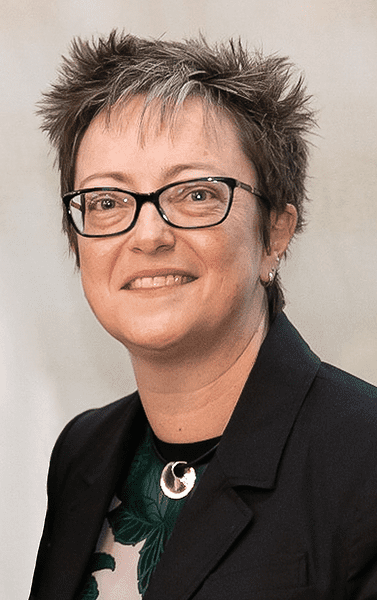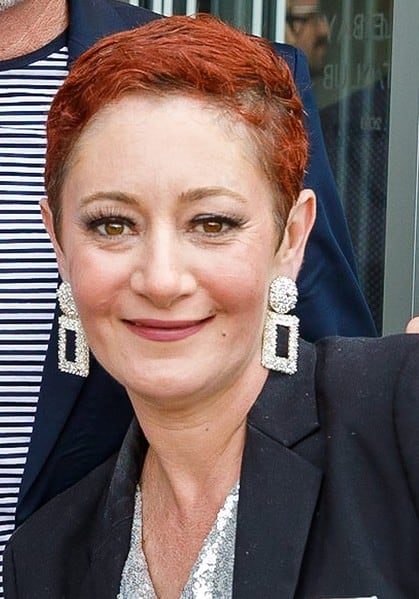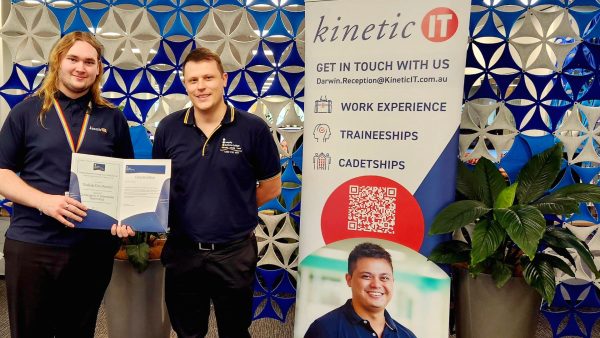To celebrate International Women’s Day, Kinetic IT is celebrating the social, cultural, economic, and political contributions of women both within the ICT industry and beyond.
This is the Sure to Rise podcast, providing a platform for a range of voices from Kinetic IT. The podcast will focus on this year’s International Women’s Day theme, Embrace Equity. Each episode aims to provide tangible insights and actions for women and allies to leverage and continue to build upon the great work done so far in the equity and diversity space.
Watch the full episode or access the transcript below.
Episode 3: Being an intersectional ally
Sydneysiders Cassie Loder, Rebekah White and Sharon Luttrell work together at Kinetic IT. In this episode, the trio share stories from earlier in their careers and how those experiences defined them. They also touch on invisible roadblocks many women face when coming from intersectional walks of life, including people with disabilities and the LGBTQIA+ community. This transcript has been edited for clarity.
Jess Etheridge: Welcome to the Sure to Rise podcast. Today, we talk to three women in leadership about what intersectional allyship looks like. Thank you so much for joining me, please introduce yourselves and let us know what you do.
Cassie Loder: Hi. Thanks, Jess. My name’s Cassie Loder. I’m the group executive across our TREC portfolio, which is Transport, Resources, Energy and Commercial. Over to you, Bek
Rebekah White: Thanks, guys. Rebekah White, or Bek as most people know me by. I’m one of the service delivery managers on our Qantas/Jetstar account. So, under my remit is our service desk, our SIAM, major incident, and Evolve and Enable team. Sharon.
Sharon Luttrell: And I’m Sharon, I am the project program manager for the Qantas account. We look after all of the projects across both contracts that we have on Qantas which is a quite a variety of different sorts of projects that we do there.
Jess: Thank you so much to the three of you for joining me. Making time out of your very busy days to have a chat about embracing equity. Maybe just a roundtable first. But what does this year’s International Women’s Day theme embrace equity mean to you? We might go back to Sharon first.
Sharon: So, for me it’s been an interesting and eye-opening discussion. I guess we always think about equity as, you know, everyone getting an opportunity, but thinking about it in terms of not everyone is starting from the same place and so looking at equity from that point of view so that everyone gets the opportunity. But that doesn’t mean that the opportunities are always going to look the same for everybody. And also the discussion around how we can support other people so that, you know, as a woman, you know, equity is important for me, but how I can support other women and other people who are potentially disadvantaged and what work I can do to support the crew that way.
Bek: Yeah, I mean, I guess following on from what Sharon said as well, for me it’s all about, you know, embracing the diversity of everybody, you know, and being aware of people’s lived experiences when it comes to opportunities and where people are in their life, in their career and trying to be conscious of what barriers are there to, you know, for people to be successful.
Cassie: Again, building on what both Sharon and Bek have said, for me, it’s about equal opportunities for everyone, regardless, and not just about gender. And really providing support, being there to listen, and also setting a good example for others to follow, even if those examples might make us feel uncomfortable sometimes. But yeah, being out there and representing for others around us.
RELATED CONTENT: Sure to Rise / Episode 1: Celebrating First Nations women and addressing the gender pay gap
Jess: Cassie, you make a really interesting point about representing. As an LGBTQ woman, what does that mean in your context?
Cassie: Yeah, look, I think for me it’s all about being comfortable being your authentic self, but that’s easier said than done for some people rather than others. And I think having been in the workforce for a long time now, more than the 50% of millennials that we’ve got in our workforce now, I think it is really important to be true to myself and be who I am and be out there representing the community, whether that’s, you know, female community or LGBTQI as well. So that’s really, really important to me. But I also recognise that a lot of people don’t have that same level of comfort. But I hope if I’m able to show that and display that, that will give other people confidence to do the same.
Jess: And Bek, the same question?
Bek: Yeah, and it’s kind of not too dissimilar to Cass. As a person who has a physical disability, so to speak, you know, I’ve had situations in throughout my career where I haven’t been given the opportunity to, you know, I haven’t gotten jobs because of it and things like that. So again, I think it’s, you know, again, being your authentic, authentic self and demonstrating that, you know, just because, you know, you might be a different race, you might have different abilities that, you know, you shouldn’t be hindered from any opportunity at all.
Jess to Sharon: From your perspective and being a woman in the workforce, how does that representation impact you?
Sharon: So a couple of things. Just thinking in terms of both Cassie and Bek’s journeys, for me, it’s how do I support them and how do I do it in such a way that I don’t make things uncomfortable because at the same time you can go a bit over the top and just, you know, be supportive, but in a way that, you know, you’re not drawing attention, but you’re providing that support, you know, and just making things normal and just working with people in the best way that you can. For me, in terms of gender, being a woman, I’ve worked for most of my career in a male dominated industry, and I’m frequently the only woman in a meeting of quite a lot of men. So it’s interesting to go through that experience and think about, you know, I’m a fairly outgoing person, but what about for women who are not as outgoing? The challenges that they face in dealing in that situation and how I can support them with my own experiences?
Jess: Are there so stories in if you would like to share or when you’ve seen something that has been inequitable, how has that impacted you? And maybe it’s helped you reframe how you approach things?
Sharon: Actually it was an experience that I had when I was much younger. I had gone to a trade show with my organisation, and I was being social and helpful and I was handing out things. My boss said to me, ‘I didn’t bring you here so you could be the dolly walking things around. I came here for you to be a professional’. I was quite embarrassed at the time, but I thought about it. He’s right, you know, I was. I was not behaving in the way that for that particular role. I mean, he was a bit blunt in his delivery, but the fact that he wasn’t viewing me any differently than my male colleagues, but I had been behaving myself in a different way. It just caused me to think about how am I showing up, and how am I delivering myself in this regard. I mean, you don’t reduce the fact that you’re a woman or, you know – I mean, clearly – but how am I showing up as a professional? And it was an interesting experience to go through at quite a young age. It made me really think how I showed in any given situation, particularly when I was dealing with a lot of men.
Cassie: I can probably look at some examples earlier on in my career where again, I’ve grown up and worked in male dominated industries as well, much like Sharon, manufacturing first and then and then into IT where the few females that were in the team or around me missed out on promotion opportunities, not because they didn’t have the capabilities, but just because they weren’t considered, because again, they might have been the quietest person in the room. It didn’t mean that they didn’t know what they were doing, that they weren’t competent, they just weren’t considered to have those opportunities. I can talk about a number of those, but again, not in recent times, that would’ve been earlier in my career that I saw that happen.
Bek: Earlier in my working career, [it was about] not getting jobs, right? You know, not being even given a chance to demonstrate my capabilities, you know, And that for me has always resonated. And I’m very conscious of when we’re hiring people or, you know, giving people opportunities, whether that’s in work or just in life, that, you know, it’s important that you know, anyone’s capable of doing anything and they shouldn’t be held back just because of a perceived, you know, a perception of what they may or may not be capable of. So that’s very important to me.
RELATED CONTENT: Sure to Rise / Episode 2: Capability versus availability
Jess: Might be a tricky one to answer. But how do you combat your own perceptions of others? You know, is it an empathy exercise where you’re trying to put yourself in other people’s shoes? Like, are there any tactics that you take, Bek, perhaps coming back to you, to challenge what perceptions or biases that you might land on initially?
Bek: Yeah, I think it’s, like you said, it is trying to put yourself in someone else’s shoes. And again, you know, being conscious of where they are in that point in time in their life, in their career, and just trying to kind of understand where they’re coming from and what it is, what point that they want to get to. So just really having empathy in that regard and just trying to understand what their experience and their lived experiences are as well.
Jess: Sharon or Cassie, do you have tactics you take sometimes to stop perceptions and biases at the door?
Cassie: Yeah, look, I think one thing is to be aware that we’ve all got them. If you say that you don’t have any, then you’re not really being true to yourself. And having people around you that you trust and that you are confident will call you out on it when something does happen. Because again, no matter how or where you are, there will be times when you don’t notice it within yourself. So for me, it’s around talking to people, getting feedback, having people around you and hoping that they feel safe enough to call you out. If they do see you acting on a bias or doing something in a way that they don’t think is appropriate.
Sharon: I agree both Bek and Cassie – surprise – but I remember I made a conscious decision when I was younger that I would not be a judgmental person. I knew a lot of judgmental people and I had been on the receiving end of judgmental people and I decided that I didn’t want to be that. I didn’t want to bring that sort of energy into the world. And sometimes that is hard and you have to catch yourself and go what judgment am I pushing here? People get to be who they are. I get to be who I am. They get to be who they are. And that’s okay. And if I don’t agree with the way they’re conducting themselves or whatever, it’s not my problem. They get to be who they are. But it is a conscious decision and it is a matter of catching yourself when you find- because we do naturally have, as Cassie said, we have those thoughts, but it’s a matter of catching them and just not letting them take root and, you know, choosing a better thought.
Jess: Really great insights. Thank you so much to all three of you for sharing that. Bek, you were very generous in sharing that your physical disability has held you back or people have not given you jobs as a result of that. What kind of impact has that had on you as a person? And there’s strength that you can take from those sorts of experiences, but it’s a bit of a balance, I imagine?
Bek: Yeah. Again, it was very early on in my career, so it was very demoralising. You know, like it was quite, it knocked their confidence out. It knocked the confidence out of me. ‘Can I really do this? Should I really be considering doing that kind of stuff?’, right. You know, eventually I got given opportunities in my career. So I think it’s just you’ve just got to back yourself, you know? I mean, I say it all the time, but it’s about being who you know, who you want to be your authentic self. But yeah, look, it’s hard when things, you know, when things like that happen, you know, not just my experiences, but, you know, I’m sure experiences of the girls as well. But when you’re young and and that kind of you are confronted with that kind of, I guess, bias it can be a bit jarring.
Cassie: And Bek, we talk about resiliency, don’t we, and how that’s helped make you resilient in who you are and you bring that through in your life and your work.
Bek: Yeah, exactly. And that’s important because, you know, I’ve got two teenage boys, but it’s important that they see me demonstrating that resilience and talking to them about those kind of things that they might come up against as well.
Jess: Cassie, has being part of the LGBTQ community helped or hindered – or a bit of both – in terms of your career?
Cassie: I don’t know that it’s helped or hindered. It’s probably just helped me be who I am and be comfortable being who I am more than anything else. And again, if you’re comfortable in who you are, then I think you can be anything that you want to be. So in that sense, I would say yes, that it has. But as has been part of many other communities in my life as well, it’s just one part of who I am. It doesn’t define me. It’s just a piece of me that makes me my whole. So yeah, I’d say that it would, Jess, amongst other things as well.
Jess: The theme that I feel all three of you have touched on is representation and visibility. And Cassie, you made an interesting comment earlier about sometimes the quietest people sometimes don’t get those opportunities. And I think IT is such an interesting industry where it attracts a lot of introverts and people who might not be the loudest people in the room, which is an interesting, different flipside of diversity. Do you resonate with that, all three of you? Or how do you kind of foster backing yourself, as Bek says, when an introvert’s nature perhaps might not be to be so outspoken? Might go to Sharon first.
Sharon: I thought you might start with Cassie first!
Cassie: I was going to say! [Laughing]
Jess: Oh yes, we’ll go Cassie! [Laughs]
Cassie: Could you have picked the least introverted person to throw to? [Laughs]
Sharon: The funny thing is I am somewhat introverted, but I am outgoing. I always have a lot to say, for everyone who knows me. Yeah. Look, it’s interesting. I have had my own challenges in that regard. I wasn’t always this outgoing, I mean I’ve always been reasonably outgoing, but there have been times, you know, I work in a very technical field and I’m not a technical person. I’ve had to deal with those challenges. And I’ve had some pretty rude people, you know, I’ve got a few stories around that. But for me, it’s also acknowledging those who are not as outgoing and making sure that they get the opportunity to say their piece. One of the challenges for somebody like me who, in this situation, I am outgoing, I do have a lot to say, is making sure that I’m not always the one speaking, that I’m not always the one putting my opinion forward, because mine is not the only valid opinion and it is only just my opinion. But getting to hear what other people have to say, what their challenges are, what their thoughts are, because they will have ideas that are completely different to me. And that’s exactly what we want. We love that diversity of idea, the diversity of thought. That’s what makes innovation and moving forward really key. So yeah, that’s probably where I go to the most, that I just have to sometimes stop talking.
Cassie: And then I’ll add to that probably the other guys on the call know this, that, yeah, I’m an extreme introvert, so that was probably something that I had to learn how to handle and do, especially being in the roles that I’ve been in in my career. And I think that’s put me in a good position to help understand other people’s perspectives. And inside my head, when extroverts start chatting, I need to make sure I’m patient to let them get their thoughts out as well. But I think going back to everything right, understanding different people’s perspectives, understanding that some people aren’t going to be comfortable speaking up in a meeting and that’s okay. It’s not that you’ve done anything wrong. It’s not that you’re not making them feel safe. It’s just not their preferred way of communicating and just making sure that we’re balancing those inputs for the different types of people as well.
Bek: And I think it’s, you know, who you surround yourself with, too, as well, you know, making sure that everyone understands each other’s strengths and weaknesses to a degree as well. But yeah, otherwise yeah, on the same page.
Jess: Maybe just one last question to wrap it all up, because the main questions were like your experiences and what impact that’s had on you, and you all very eloquently shared that. So I appreciate it. Thank you. It might be a bit hard, but what is your final piece of advice to those who want to embrace equity? You know, particularly if you’re an ally to women from other diverse intersectional communities or to an introvert in the team, what’s some advice you might have?
Cassie: I think we’ve all spoken about it in different ways, and I think that’s around taking the time to understand the people around you, you know, being there as an example and a role model for others and really just seeking support along the way because you can’t do it on your own. But yeah, what would you say, Bek?
Bek: That’s pretty much what I was going to say as well. I think it’s important for people to, you know, we want to make sure that we’re cultivating a culture of inclusivity, right? And that includes diversity across all, you know, at all levels. But again, yeah, it’s just being conscious that people’s differences are what make them unique and that it’s important to embrace those.
Sharon: And I think it’s one of the things that can make an environment really special too, when you’ve got all of those different personalities and different thoughts and all that sort of stuff, it really brings a lot to it. So rather than, you know, shying away from it, really embracing that, but being very aware that there are some blockers for some people that other people are not going to experience and just recognising what they are and doing what you can to remove them.
Cassie: And one thing I love the most about Kinetic IT, and that comes out when you talk to crew, leaders and in crew engagement surveys, is how comfortable people feel being their authentic self. Right. I don’t think you can. Well, I know that’s one of the things that makes me most proud to be a part of this business.
Bek: Yeah. Agreed.
Sharon: Absolutely.
Jess: Well, thank you so much to the three of you for your time. This has been episode three of the Sure to Rise podcast.
Visit the Kinetic IT website for future episodes.
About Cassie Loder
Cassie Loder is Kinetic IT’s Group Executive, Transport, Resources, Energy and Commercial, and has been with the company for five years. She is a courageous, connected and curious leader, passionate about inspiring and supporting others to embrace a growth mindset and healthy striving for excellence.
About Rebekah White
Rebekah White, Service Delivery Manager, is based in Sydney and joined Kinetic IT in 2017. She oversees service delivery, service integration and management (SIAM), major incident management and general operations.
About Sharon Luttrell
Sharon Luttrell is Kinetic IT’s Program Manager for New South Wales, after joining the organisation in 2018. Over 18 years in the IT industry, Sharon has experience across Project and Program Lifecycle management, outsourcing, infrastructure and development projects and most recently has specialised in transformation programs assisting customers across multiple industries to transform their environments in a way to better meet their users needs.
















